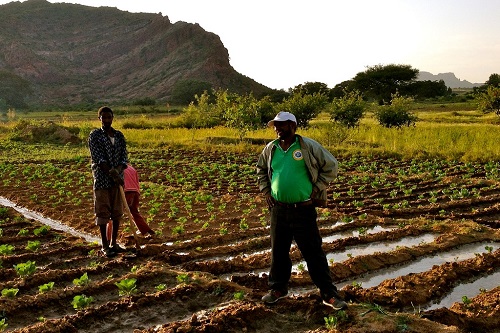MERET photo
By
Abebe Wolde Giorgis
Agriculture contributes 85 percent of Ethiopia’s export income and supplies raw material for manufacturing but many agreed that due to underdevelopment of the sector and an obsolete trade system, the sector is not rapidly changing. Hence to improve the situation necessary attention should be given.
“The export items are very few and the volume also is limited and relies on the traditional items such as coffee, oil seeds, skin, hides and leather products. The raw form of the items and their poor quality compromise their competitiveness in the outside market, as a result of which, the nation still earns very little hard currency from these items, hence through value addition of the products, enhancing its earning capacity is essential,” said Endalkachew Sime the Ethiopian Trade and Sectoral Association Council Secretary General.
According to him, the underdevelopment of the agricultural sector impedes exports. He further said that the sluggish supply of agricultural products to the market also stagnates the utilization of the products to use as inputs for local manufacturing.
According to the Ministry of Trade Communication Head Wondimu Flate, the second Growth and Transformation Plan put a high priority on intensifying the productivity of smallholder farmers. It also supports the expansion of market oriented agriculture and promotes private investment.
Currently the productivity of most average farmers is two to three times lower than the better farmers, therefore to improve productivity, the first strategic direction of the Growth and Transformation Plan underlines the scaling up of the best practices of the rich farmers to the average farmers. This includes expanding irrigation coverage and shifting from small scale to higher production of high value crops with complementary investments in market and infrastructure development.
“The agriculture sector is expected to play a key role in ensuring food security, supply raw material to the emerging manufacturing sector and enhancing export earning and for that utilizing agricultural inputs in wider areas, and improving trade by reducing transaction cost through expanding rail, road and air transportation” added Wondimu.
He further said that, to host the emerging manufacturing sector, which is expected to utilize agricultural products as an input, the government is aggressively engaged in expanding industrial parks. Currently factories such as mills, leather, textile garment, footwear, food and beverage firms are beginning production in the parks.
Factories process agricultural products, add value and are therefore competent in the outside market, ultimately boosting exports and hard currency earning capacity. Value added products can serve as import substitutions and this indirectly strengthens the nation’s currency reserve.
According to the World Bank’s recent report Ethiopia is establishing industrial zones which conform with international best practices and this implies that building a quality infrastructure and fostering a sound business environment is essential.
“The expansion of industrial parks to host the emerging manufacturing industries is essential but this is not enough. The agricultural sector still did not satisfy the domestic factories’ demand. As a result, some mill factories import wheat from abroad and spend the badly needed hard currency. In a similar manner, textile factories spend huge amounts of hard currency for the importation of cotton and such a situation for the poor country of Ethiopia is not affordable. If the sector is import dependent the trade balance between import and export will be widened,” said Endalkachew.
Currently the trade balance rose from to 1 to 5 which means the import is fivefold to the export, hence to make the agriculture surplus enough for domestic demand and export, modernizing the sector should be taken as a way out.
Side by side with these, before going to production, farmers should plan to whom they supply.
To modernize the sector expanding large and extended farming is vital. “There is vast arable land which could be cultivated through irrigation which makes the nation the fifth cotton producer in the world. There is 3 million hectare cultivable land suitable for cotton farming both by rain and irrigation but only 2 percent of it is utilized,” added Endalkachew.
Dr Tadesse Kuma is a senior researcher at the Institute of Development Research and according to him, the Ethiopian export sector from 1998 to 2015 grew by 23 percent. However from the year 2015 onwards the performance declined. In the GTP one it was planned to export 529 thousand tonnes of coffee but only 197 thousand tonnes were exported, the nation earning 880 million USD.
The major reason for this is due to lack of incentive. When exporters lack incentive they will shy away from doing business. If the business is not feasible no one shows interest to involve and currently traders find domestic trade more feasible than export. The expansion of illegal trade also discourages traders and the expensiveness of trading costs also has its own drawbacks. The market fluctuation in international trade also has an impact.
“There are some bureaucratic hurdles in transiting exports which hampers trade, though on the other hand, traders also show reluctance to supply their export items in a speedy manner. In addition, not taking their items from dry ports affects the smooth transaction, hence to tackle the problem the government is trying its level best,” added Wondimu.
Abebe Wolde Giorgis
Abebe Wolde Giorgis was born in Harar, Ethiopia. He has a B.A from Addis Ababa University in English Language and Literature, Minor History.
For 17 years he has been a Journalist in local and International Media, Amharic and also an English Newspaper.He wrote several articles on environment and economics.
Member of Environment journalist association, he was deputy editor in chief of an Amharic Newspaper and Senior Editor of the Ethiopian Herald.



No Comments Yet!
You can be first to comment this post!